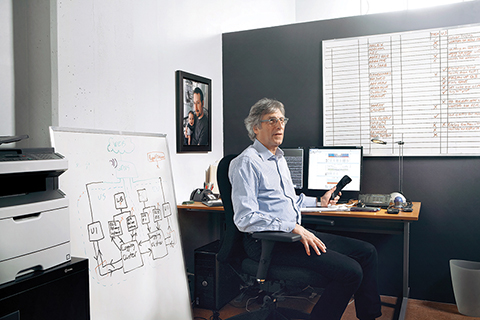A family business usually passes from parent to child. Our family was different: this is our story of a reverse succession.
Our son Jeremy was an Internet business entrepreneur. He had a product that the rapidly evolving online world needed: Project Sunblock, a tool that monitors online ad placement in real time to ensure that a company’s ads don’t land on websites that could damage the company’s reputation (such as pornographic sites), or on pages that don’t align with the company’s message. A car company, for example, might not want its ad to pop up next to a story about a car accident; or a fast food company beside a story on childhood obesity. It was his “app for that.”
Then, just as his business was taking off, cancer struck.
We were told at the hospital that they would monitor it. The doctors said, “It looks low-grade; we’re not going to touch it; carry on.”
We carried on. Eventually, Jeremy and I made the decision to change my role at his company, ArtsandTV, from investor to CFO. My knowledge of Internet-related tools was limited but Jeremy was teaching me. I was in my sixties, partially in retirement, and learning how to develop a business in a new industry. It felt like I was beginning my career 2.0.
Within a short time we celebrated Jeremy’s wedding and soon after that, the birth of his child, our grandson. On the business side, we attracted more clients including AdBrite, an American ad exchange that employs Project Sunblock as a tool to verify websites before bidding on ad space. Jeremy’s company gained a trial contract with Microsoft in their U.K. ad network. It was a deal that would ultimately send billions of impressions a month through Sunblock’s servers. In short, not only did it seem as though things were going to be normal for us, but we were hitting commercial success.
Then in 2010, Jeremy suffered a major seizure. The cancer took over, knocking him out of the office, and throwing him into punishing chemotherapy treatments. He tried to keep up with office work from home, but the disease progressed with astonishing speed.
When his eyesight deteriorated, he had computer code printed in a large font. When he couldn’t type, the caregivers who had moved into his house punched in the code for him.
By the 2010 Christmas holidays, he was in the hospital.
On January 29, 2011, our son passed away. He was 35.
Weeks later, Project Sunblock was scheduled to present at a Las Vegas conference attended by thousands of IBM partners and clients. I flew across the continent and spoke on Jeremy’s behalf. Afterwards, attendees approached to ask questions, and I could only think that I wasn’t the one who should be there.
It was challenging enough to vet technical questions on the product any day. Now my role as the face of the company was even more difficult. I felt the generation gap, the peculiar experience of working in a field dominated by 30-somethings, not 60-somethings. It’s an odd feeling to take on the leadership of your son’s company. To help with the process, I pulled together an advisory board of friends and experts – in law, online advertising, marketing – to give me guidance and advice. What my wife, Margaret (MEd 1979) and I want more than anything is for the company that our son spent so much energy building to succeed as a legacy for Jeremy’s son, who is now four and a half.
Our family decided to take other actions to ensure Jeremy’s short life would not be forgotten. We wanted to make his name live on through the thing that sparked his creativity: the Internet. We chose to head a campaign to dedicate the Internet café in the new Bridgepoint Hospital to Jeremy’s memory. It will be a place where patients can communicate with their family and friends, and stay connected with current events and their lives outside the hospital. With support from friends and family we have raised 70 per cent of our $500,000 goal.
With my retirement on hold for a little while longer, I find peace in knowing Jeremy’s dream is on its way to being fulfilled in business, at the hospital and in his own family.
Ian Lightstone (MBA 1968) is a graduate of the Rotman School of Management and Chair of ArtsandTV.
Recent Posts
For Greener Buildings, We Need to Rethink How We Construct Them
To meet its pledge to be carbon neutral by 2050, Canada needs to cut emissions from the construction industry. Architecture prof Kelly Doran has ideas
U of T’s 197th Birthday Quiz
Test your knowledge of all things U of T in honour of the university’s 197th anniversary on March 15!
Are Cold Plunges Good for You?
Research suggests they are, in three ways




